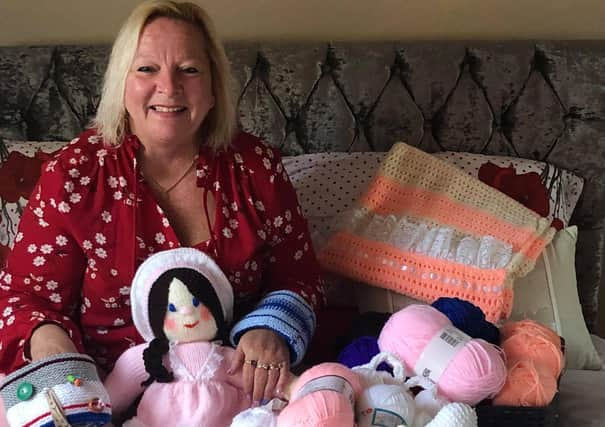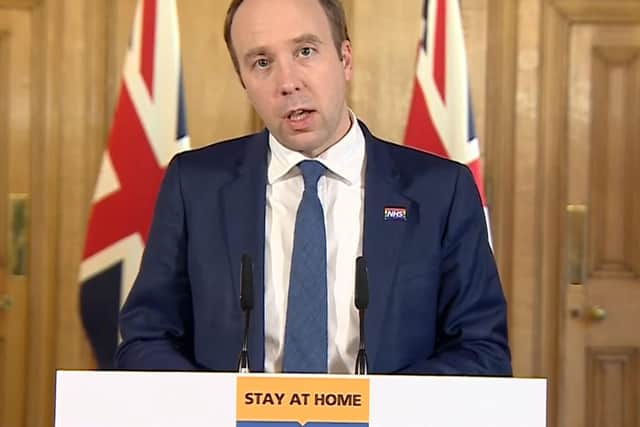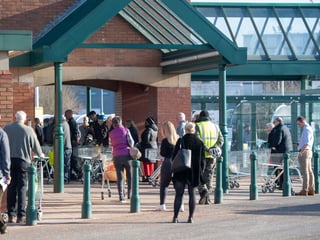Coronavirus: Why community spirit is the silver lining – Bill Carmichael


And without in any way trying to underplay the seriousness of the current situation, I would say you don’t have look for long to realise there is still plenty of good in the world.
The cloud is dark and threatening, but there is a bright silver lining that gives us hope for the future.


Advertisement
Hide AdAdvertisement
Hide AdThe first and most notable example is the terrific revival of community spirit that always seems to come to prominence in times of adversity.
In my street people, who normally hardly speak to each other save for the occasional hello, have been popping notes through neighbours’ doors, offering to pick up groceries and medical prescriptions and leave them on the front step.
As a result we now have a new network, connected by mobile phone and email, dedicated to looking after the elderly and most vulnerable amongst us.
From numerous reports I have read, these sorts of community self-help initiatives are happening all over the country – and they form a solid foundation of resilience that can relieve the pressure on the NHS, the police and social services.


Advertisement
Hide AdAdvertisement
Hide AdIn a similar vein my local food bank, run by the churches, was suddenly denuded of volunteers when all the over-70s were ordered to stay away for fear they could catch the virus and fall ill.
The organisers turned to the wider community for help in keeping this essential service going, and were overwhelmed by the level of support that flooded in from people eager to fill empty hours with productive and valuable labour.
These are small, local initiatives, but the big-hearted kindness of the British people was also on display at a far bigger, national level this week.
A few days ago Matt Hancock, the Health Secretary, put out a call for 250,000 NHS volunteers to come forward to deliver food and medicines to the elderly and sick and to help defeat the coronavirus.
Advertisement
Hide AdAdvertisement
Hide AdIt was seen as a hugely ambitious target during a time when many people are living in fearful and anxious self-isolation. Would people come forward in sufficient numbers to make any real difference?
The answer to that question was absolutely emphatic – in a little over 24 hours an astonishing 560,000 people had put their names forward via an online form.
As a result, there is a veritable army of NHS volunteers ready to swing into action against the coronavirus.
In addition about 12,000 former NHS staff have come forward, including 2,600 retired doctors and more than 6,000 nurses, plus more than 18,700 student nurses and 5,500 final year medics.
Advertisement
Hide AdAdvertisement
Hide AdLittle wonder that NHS England medical director Stephen Powis admitted he was “bowled over” by the altruism shown by retired staff and the general public.
The instructions to stay at home for most of the day can be a blessing as well as a curse. For many it is a chance to catch up on the housework, to tackle that list of DIY jobs that has grown longer with each passing week, and perhaps get stuck into that pile of books on the bedside table you had been meaning to read for months.
For those cooped up with family members there is a good chance we’ll get on each other’s nerves, especially when boredom sets in. But why not try something radical – like switching off all the screens and actually talking to each other? You never know you might like it!
The chance to get out of the house for daily exercise is a godsend. From my house, in 30 minutes on foot I can be on the top of a crag or deep in ancient woodland.
Advertisement
Hide AdAdvertisement
Hide AdEarlier this week I was surprised and delighted to encounter a large number of peacock butterflies, probably brought out early by the recent sunny weather.
I understand that not everyone is lucky enough to live in the Yorkshire Dales, like me, but even in the city centres there are plenty of fantastic walks that can open your eyes to the wonderful world around you.
And perhaps the current crisis may just spur us to concentrate on the things in life that really matter. And that is not the latest iPhone, fashion accessory or powerful car – but family, friends and community.
Comment Guidelines
National World encourages reader discussion on our stories. User feedback, insights and back-and-forth exchanges add a rich layer of context to reporting. Please review our Community Guidelines before commenting.
